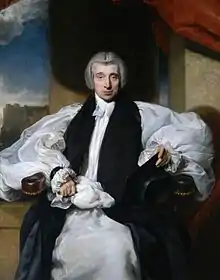William Van Mildert
William Van Mildert (6 November 1765 – 21 February 1836) was the last palatine bishop or prince-bishop as Bishop of Durham (1826–1836), and one of the founders of the University of Durham.[2] His name survives in Van Mildert College, founded in 1965 and the Van Mildert Professor of Divinity.
William Van Mildert | |
|---|---|
| Bishop of Durham | |
 William Van Mildert by Thomas Lawrence | |
| Diocese | Diocese of Durham |
| In office | 1826–1836 (death) |
| Predecessor | Shute Barrington |
| Successor | Edward Maltby |
| Other posts | Bishop of Llandaff (1819–1826) Dean of St Paul's (1820–1826) |
| Personal details | |
| Born | 6 November 1765 Blackman Street, London[1] |
| Died | 21 February 1836 (aged 70) Auckland Castle[1] |
| Buried | Durham Cathedral[1] |
| Nationality | British |
| Denomination | Anglican |
| Spouse | Jane Douglas (m.1795)[1] |
| Profession | Church of England |
| Education | Merchant Taylors' School[1] |
| Alma mater | The Queen's College, Oxford[1] |
Life
He was the son of Cornelius van Mildert, a gin distiller, and his wife Martha née Hill. Cornelius Van Mildert was the great-grandson of an Amsterdam merchant who migrated to London around 1670, Martha the daughter of William Hill of Vauxhall, Surrey, merchant and financier. William van Mildert was educated at St Saviour's Grammar School, Merchant Taylors' School (then in London) and the Queen's College, Oxford. Loosely attached to the high church party, he was appointed Bishop of Llandaff from 1819 to 1826, a post which he held in commendam with the Deanery of St Paul's between 1820 and 1826, when he was translated to Durham. Prior to this, he was in 1790 he curate of Witham, Essex were he met Jane (1760-1837), daughter of General Douglas, who he married in 1795[3]..He became rector of the church of St. Mary-le-Bow in London and Regius Professor of Divinity at Oxford, where he gave the Bampton Lectures for 1814. Van Mildert is often described as a 'stormy petrel' on account of his outspoken expression of his views. As Bishop of Llandaff he broke with the practice of his predecessors and actually resided in the diocese. As the bishop's palace had fallen to ruin, he rented Coldbrook House near Abergavenny. During his time in Llandaff, he gained a reputation as "a conscientious diocesan".[1]
As part of the University of Durham's foundation, behind which he was the driving force, he gave Durham Castle to the university, where it became the home of University College. Auckland Castle therefore became the sole residence of the Bishop of Durham. In addition, he donated a large number of buildings on Palace Green, between the Castle and the Cathedral. These are currently in use by various departments of the university (principally law, music and a small portion of the University Library).
Van Mildert was the last Bishop of Durham with significant temporal powers as a Palatinate Prince-Bishop.[4] Those secular powers were removed and returned to the Crown after his death in 1836 by the Durham (County Palatine) Act 1836.[5]
In truth, most of the secular power of the Bishop of Durham had already been removed by that time. The Great Reform Act 1832 saw the removal of most of the Prince Bishop's powers although he maintained a seat in the House of Lords and The Municipal Corporations Act 1835 gave the governing power of the town of Durham to an elected body.[6]
References
- Varley, Elizabeth (2007) [2004]. "Mildert, William". Oxford Dictionary of National Biography (online ed.). Oxford University Press. doi:10.1093/ref:odnb/28096. (Subscription or UK public library membership required.)
- "Van Mildert papers". Durham University. Retrieved 19 January 2012.
- "Van Mildert Papers". Archives Hub. Retrieved 29 October 2020.
- "Van Mildert, Bishop William". Today. 11 July 2017. Retrieved 5 November 2019.
- The Statutes of the United Kingdom of Great Britain and Ireland. His Majesty's Statute and Law Printers. 1836. p. 130.
bishop of durham temporal Powers by Palatine Act 1836.
- Northern Europe: International Dictionary of Historic Places. Routledge. 28 October 2013. p. 240. ISBN 978-1884964015. Retrieved 5 November 2019.
| Academic offices | ||
|---|---|---|
| Preceded by William Howley |
Regius Professor of Divinity at Oxford 1813–1820 |
Succeeded by Frodsham Hodson |
| Church of England titles | ||
| Preceded by Herbert Marsh |
Bishop of Llandaff 1819–1826 |
Succeeded by Charles Sumner |
| Preceded by George Pretyman Tomline |
Dean of St Paul's 1820–1826 | |
| Preceded by Shute Barrington |
Bishop of Durham 1826–1836 |
Succeeded by Edward Maltby |
